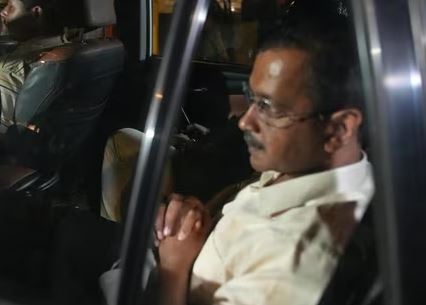New Delhi: Delhi Chief Minister Arvind Kejriwal was Friday remanded in Enforcement Directorate’s custody till March 28, a day after the central agency arrested him in a money laundering case linked to the alleged excise policy “scam”, in a huge setback to an icon of the anti-corruption movement of 2013 and his Aam Aadmi Party (AAP) ahead of the Lok Sabha elections.
Kejriwal was arrested Thursday after he had skipped as many as nine ED summonses asking him to appear before it to answer questions about alleged illegalities in formulation and execution of the Delhi government’s excise policy for 2021-22, which was eventually scrapped amid allegations of corruption.
Special judge for Prevention of Money Laundering Act (PMLA) cases Kaveri Baweja ordered the ED to bring Kejriwal back to court March 28 at 2 pm.
The court remanded Kejriwal in ED custody for six days after the agency pressed for his custodial interrogation for 10 days while accusing the AAP national convenor of not cooperating with the investigation. It said Kejriwal needed to be confronted with the other accused and evidence that the federal anti-money laundering probe agency has gathered.
With Kejriwal’s arrest, AAP, the governing party in Delhi and Punjab, has been shorn of a host of leaders who could have led the party’s campaign in the general elections. His once deputy Manish Sisodia and Sanjay Singh, a vocal and articulate leader, are already behind bars in the excise policy case.
“My life is dedicated to the service of the nation whether I am inside or outside (jail),” Kejriwal told TV9 Network while he was being produced in the court in his first reaction after arrest.
The ED told Special Judge Kaveri Baweja at the Rouse Avenue court that Kejriwal received several crores of rupees as kickbacks from the ‘South Group’ for formulating and implementing the Delhi Excise Policy 2021-22.
He demanded Rs 100 crore from some accused from the ‘South Group’ for contesting elections, Additional Solicitor General (ASG) SV Raju told the court.
The law officer said the money trail showed that Rs 45 crore “kickback” was used in the Goa Assembly elections came from four hawala routes.
He said the statements of the accused and witnesses have been corroborated by Call Detail Records (CDR).
The central agency alleged Kejriwal was culpable in the case not only as an individual but was vicariously responsible for the actions of his associates.
Senior Advocate Abhishek Singhvi, appearing for Kejriwal, claimed there was a conspiracy to keep the AAP leader behind bars so he cannot campaign in the upcoming general elections.
He said the level playing field for the polls has been disturbed with Kejriwal’s arrest and his remand will further jeopardise the opposition’s electoral campaign.
Kejriwal was produced before the special ED court after he withdrew from the Supreme Court the plea against his arrest by the Enforcement Directorate. The apex court had said the petition would be heard during the day.
The move came soon after the Supreme Court refused to grant bail to BRS leader K Kavitha, who has also been arrested by the Enforcement Directorate in the Delhi excise policy scam case. The ED has claimed that Kavitha, a BRS MLC and daughter of former Telangana chief minister K Chandrashekar Rao, was a key member of the south cartel.
The ED claimed Kejriwal “took advantage” of being the chief minister of Delhi to facilitate money laundering by the Aam Aadmi Party (AAP), which is a “major beneficiary” of the proceeds of crimes generated.
“Arvind Kejriwal, chief minister of NCT of Delhi is the kingpin and key conspirator of the Delhi Excise scam in collusion with ministers of Delhi government, AAP leaders and other persons,” the federal agency claimed before the special PMLA court while seeking his custody.
It claimed in its remand papers that “Arvind Kejriwal was involved in the conspiracy of formulation of the excise policy 2021-22 to favour certain persons and also involved in the demanding of kickbacks from liquor businessmen in exchange of favours granting in the said policy.”
The ED alleged Kejriwal was directly involved in the use of the proceeds of crime generated in the Goa election campaign as the “ultimate decision maker”.
The agency claimed before the court it has recorded the statements of various people engaged in the election campaign-related activities of the AAP during the Goa polls and found that “cash payments were made to them for work like survey workers, area managers, assembly managers etc”.
“These persons and activities related to the election campaign were overall managed by Vijay Nair (former AAP communications chief arrested in this case) and Durgesh Pathak, AAP MLA.”
The agency claimed these charges were also corroborated by one of the AAP candidates.
The ED has, for the first time in the about two-year-old probe, said the AAP was the “major beneficiary of the proceeds of crime generated in the Delhi liquor scam”.
It is for the first time that a political party has been accused of money laundering, and if proved, stringent action like freezing of its accounts may follow.
The ED alleged that a part of these “proceeds of crime”, to the tune of about Rs 45 crore in cash, was utilised in the AAP’s election campaign for the Goa assembly polls.
“In this manner, AAP has committed the offence of money laundering through Sh Arvind Kejriwal and the offences thus are covered by section 70 of the PMLA,” it said.
PTI
